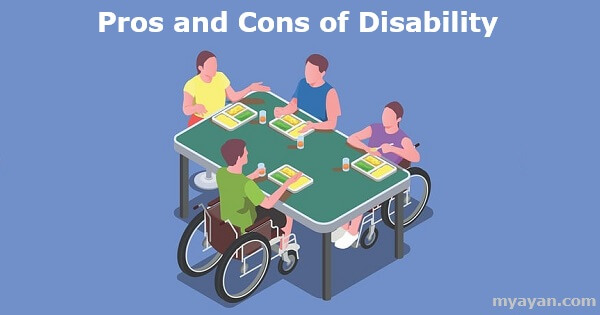How do you identify your disability, and how do people take it differently? Even though societies are developed and more educated, there are still some social stigmas disabled people face today. According to the U.S. Census Bureau data from 2021, approximately 42.5 million Americans, accounting for 13% of the civilian noninstitutionalized population, have disabilities. Disability can impact your life in several ways, presenting you with both challenges and opportunities. Here are some of the prominent pros and cons of disability to help you understand how this lifestyle can affect you socially, financially, and psychologically.
Disabled people can have many benefits from the government and private sector. The major pros of disability include:
People with disabilities are eligible to receive Social Security Disability Insurance (SSDI) benefits from the federal government. These benefits offer financial support for people who are either unable to work or have lost their income source because of disability. Not just individuals, the government also provides financial support to their family members.
Tax relief includes the Disability Tax Credit (DTC), a non-refundable tax credit for people certified by a medical practitioner as having an impairment in physical or mental functions.
This credit is based on the severity of the disability, giving it more weight than other credits. Other tax credits and deductions available for people with disabilities include the Canada Caregiver Credit, the Disability Amount, Medical Expense Tax Credits, Working Income Tax Benefit (WITB), and various provincial or territorial benefits.
Children with disabilities are eligible for educational benefits. These can include special education services or accommodations set up through an individualized education program (IEP).
For example, a student has access to specialized instruction and related services. These include speech therapy, physical therapy, adaptive physical education, mental health counseling, and assistive technology. Students are also eligible to access accommodations such as extra time on tests, modified assignments, and increased access to tutoring.
People with disabilities can often access a wide variety of community supports such as respite care, transportation assistance, employment services, and recreational programs. These supports are designed to help people living with disabilities better integrate into the community and lead a more independent life.
The use of assistive technology can be incredibly helpful for people with disabilities. This technology includes tools such as wheelchairs, hearing aids, and communication devices that can help individuals better navigate the world around them.
Although there are many benefits to having a disability, it is important to recognize the potential downsides as well. The major cons of disability include:
Having a disability can often mean additional costs such as medical expenses, modified vehicles, and specialized equipment. This can present a challenge for individuals who are already struggling financially due to their disability.
For people with physical disabilities, having limited mobility can be a major challenge. This can limit their ability to participate in activities such as sports and recreational outings that many people take for granted.
People with disabilities often face social challenges due to discrimination or lack of understanding from the general public. This can lead to feelings of isolation and loneliness, which can have a negative impact on mental health.
Despite the progress that has been made in recent years, many people with disabilities still face challenges when it comes to employment. This is due to discrimination from employers or lack of accessible workplaces and equipment.
For some people with disabilities, having limited mobility or other physical limitations can mean a lack of independence. This can make it difficult to live alone or without the assistance of family and friends.
Conclusion on the Pros and Cons of Disability
All of the factors mentioned above serve as a reminder that disability is a complex issue to navigate and involves multiple intersecting facets. Ignoring the disabled means that the people continue to be excluded from conversations and decisions, so it is vital to create meaningful change.
On an individual level, further investigation should be done into any area that affects one’s personal experience of disability, such as introducing lifestyle changes or learning about opportunities for empowerment at the local level.
Ultimately, engaging in thoughtful conversations and meaningful action helps us gain better clarity on the issue of disability—allowing us to make progress in creating something better for ourselves and our communities.

This can encompass feelings of unease, self-consciousness, and occasionally even a profound and overwhelming dread of eventually experiencing disability firsthand. Additionally, some perceive identification with disability as a negative attribute.
We lead uniquely different lives, allowing us to experience and learn things that individuals without disabilities may not. Likewise, non-disabled individuals encounter and learn from experiences that are distinct from others.
Disability encompasses various conditions that can hinder individuals from engaging in certain activities or accessing equal societal opportunities. These conditions can manifest as cognitive, developmental, intellectual, mental, physical, sensory impairments, or a combination of these factors.
Disability insurance provides essential financial support if illness or injury prevents you from working. It can help cover vital expenses like food, utilities, school tuition, mortgage, and car payments. With disability insurance, you can have peace of mind knowing that your financial needs will be handled during challenging times.